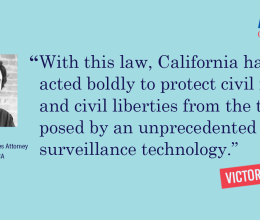In response to the release today of a U.S. Department of Justice report examining the San Diego Police Department’s policies and practices “related to preventing and detecting misconduct,” the ACLU of San Diego & Imperial Counties issues the following statement, attributable to Margaret Dooley-Sammuli, policy director.
SAN DIEGO – We are gratified by the seriousness with which the Police Executive Research Forum (PERF) conducted its assessment of the policies and practices of the San Diego Police Department (SDPD) for preventing, detecting, and investigating police misconduct in its report, Critical Response Technical Assessment Review: Police Accountability—Findings and National Implications of an Assessment of the San Diego Police Department. The review focused on 17 specific cases of misconduct and the policies that prevent accountability and early detection of problematic behavior. “Strong efforts must be taken to ensure transparency and responsiveness to community concerns and complaints,” the report stated in its conclusion. “The SDPD must now use its experiences and the recommendations from this assessment as a launching point for making additional changes and providing further training to its officers and supervisors in areas of concern to the community, especially in response to concerns of police bias.” [Emphasis added.]
We understand that SDPD officers have a difficult job, and many officers perform their duties with a commitment to professionalism, protection, and service. We appreciate the diligence of PERF and the strength of the report’s two-score specific recommendations, including changes to recruitment and hiring practices, improvements to supervision and training, improving complaint handling, and a recommitment to rebuilding the broken trust with the community. We are hopeful that the Department will accept the recommendations in the report to eliminate gaps in policy allowing misconduct to go unnoticed and unaddressed.
Although the report mentions in several places that the community clearly voiced concerns of racial bias in policing, it deliberately skirts the issue (other than asking the Department to “consider” a program to address unconscious bias in policing). The San Diego ACLU, and many community organizations and leaders, believe there is a culture in the SDPD of selective intimidation and widespread ethnic and racial profiling that do not represent San Diegans’ values of fairness and equality.
Communities of color and economically disenfranchised communities should be able—like all of us—to consider the police department a place to turn to for safety and security. But all too often, they are instead victimized by officers who use racial profiling, illegal searches, and other intimidating actions in interactions with these populations.
It is time for the SDPD to modify its overall culture and make a commitment to protecting and serving all San Diegans. No San Diegan should be subjected to profiling by the SDPD. The SDPD must have a zero-tolerance policy towards racial and ethnic profiling.
Typical of the problem that people of color in San Diego constantly face is the experiences of Stephen Pierce, a former NFL player with the Cleveland Browns and a resident of La Jolla. “I am reminded every day by police officers that I do not belong in La Jolla,” said Pierce. “I am followed and when I am finally stopped by police officers, I am asked, ‘Is this your car?’ ‘Is it stolen?’ ‘Why are you in the neighborhood?’ and ‘Are you on parole or probation?’ They say some things change with age, but I guess when you are an African American man in San Diego, no matter how old you are, the harassment and disrespectful treatment by the San Diego Police Department stays the same.” Pierce is president of the San Diego NFL Players Association.
The San Diego ACLU echoes the calls in the report for the SDPD to increase measures that allow for accountability and transparency, so that those who are victims of intimidating behavior can report the abuses and reasonably expect a thorough investigation and resolution to their complaint. A police department that seeks and expects respect and trust should welcome such measures.
Further, the SDPD should institute training to ensure that officers are not engaging in behavior that singles out communities of color, LGBT people, women, the poor, or disabled for different treatment.
Although we welcome the scrutiny paid to SDPD by PERF and support most of the recommendations made, the report is not a comprehensive assessment of necessary reform. Instead, it should serve as a starting point for a much larger conversation of how to increase transparency, accountability, and community trust.
ACLU Statement on Report Assessing SDPD's Misconduct Policies
Related Issues
Related content

Lagleva et al. v. Doyle
October 14, 2021
The C.R.I.S.E.S. Act (AB 2054)
August 10, 2020
P.R.O.M.I.S.E Act (AB 1007)
August 10, 2020
What to do if you're stopped by the police or law enforcement .
August 9, 2020Advocacy
August 5, 2020
Kenneth Ross Jr. Decertification Act (SB 731)
June 30, 2020
ACLU: Authorities Must Develop COVID-19 Prevention and Management...
March 12, 2020
ACLU: San Diego Police and Sheriff’s Department data shows...
January 21, 2020

